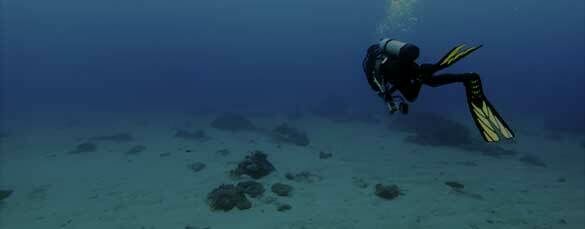Epilepsy
An epileptic attack occurring underwater while using conventional scuba equipment is usually a fatal event, since the mouthpiece is likely to be lost and large quantities of water inhaled during the clonic phase of the fit. It is therefore imperative that no epileptic should dive if there is any serious possibility of an attack occurring underwater.
A second factor which has to be considered is the nature of the drugs used to control epilepsy, which are all, to some degree, sedative in nature and would thus exacerbate nitrogen narcosis or cause it to come on at an unexpectedly shallow depth. For this reason, it is not considered safe for any epileptic to dive if he/she is currently taking any anti-epileptic medication.
Since hyperbaric oxygen is known to provoke convulsions in normal individuals, it was formerly considered that epileptics would be at increased risk when exposed to the raised partial pressure of oxygen in compressed air breathed at depth. However, it is now known that the mechanism of the attack is different, and epileptics are not more susceptible to convulse under pressure. Thus, this factor can be disregarded.
The relapse rate in epileptics who are taken off medication decreases exponentially, with the majority of those relapsing doing so within the first eighteen months of ceasing treatment and the rate of relapse becoming insignificant after three years (1,2).
The suggested requirements for an epileptic to be permitted to dive are therefore set at five years free from fits and off medication. Where the fits were exclusively during sleep, this can be considered on an individual basis with the committee through the appeals process.
A past history of petit mal should not disqualify, provided that no attacks have occurred for five years and that the condition has not progressed to epilepsy. Pyrexial convulsions in childhood may be disregarded if not followed by epilepsy.
Post traumatic epilepsy: see medical standard on Head Injury and Diving.
References:
1. Anonymous. Should epileptics scuba dive? JAMA 1985. 254:3182-3.
2. Callaghan N, Garrett A, Goggin T. Withdrawal of anticonvulsant drugs in patients free of seizures for two years. N Engl J Med 1988. 318: 942-6.
3. Dreifuss FE. Epileptics and scuba diving. JAMA 1985. 253:1877-8.
4. Edmonds C, Lowry C, Pennefather J. Diving and subaquatic medicine. 3rd ed. Butterworth Heinemann, Oxford 1992 p470.
5. Shinnar S, Vining EP, Mellits ED, D’Souza BJ Holden K Baumgardner RA Freeman JM. Discontinuing anti-epileptic medication in children with epilepsy after two years without seizures. N Eng J Med 1985. 313: 976-80.



